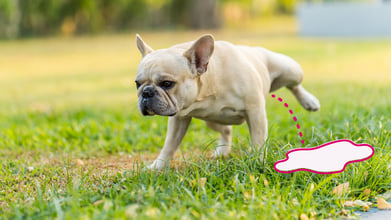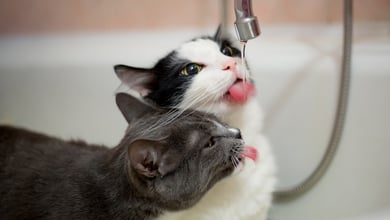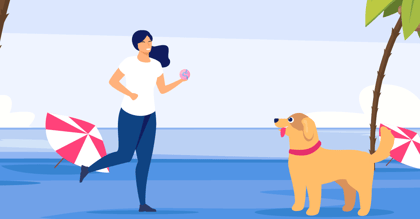The Common Causes of Excessive Thirst in Dogs

Table of Contents
Noticed your dog drinking more water lately? While occasional increases in thirst can be due to factors like activity or weather, consistent excessive drinking, known as polydipsia, can signal underlying medical issues. When paired with increased urination or polyuria, it's especially concerning.
Typically, excessive thirst is characterized by a dog consuming more than 100 mL of water per kilogram of its weight daily. A short-term spike in water intake over a few days, perhaps due to rigorous exercise or a heatwave, usually isn't a cause for alarm. However, if you find your dog's thirst consistently elevated, monitoring and assessing the situation is crucial.
Let's explore the potential causes and solutions for your dog's increased thirst!
1. Diabetes
Both forms of diabetes, mellitus and insipidus, can lead to dogs drinking more water than usual. While diabetes mellitus is typically managed with insulin shots, dietary adjustments, and weight management, the treatment for diabetes insipidus often involves desmopressin acetate.
1. Has your dog experienced rapid weight loss?
2. Has your dog’s appetite increased or decreased?
3. Is your dog more thirsty than usual?
4. Is your dog urinating more frequently than usual?
5. Is your dog less active than usual?
6. Does your dog have cloudy eyes or is experiencing vision problems?
7. Is your dog experiencing frequent urinary tract infections?
8. Does your dog have sweet-smelling breath?
9. Does your dog seem more lethargic than usual?
10. Does your dog have a family history of diabetes?
11. Is your dog's coat dull or thinning?
12. Has your dog had frequent skin infections?
1. Is your cat urinating more frequently than usual?
2. Is your cat more thirsty than usual?
3. Has your cat experienced rapid weight loss?
4. Is your cat showing signs of muscle weakness?
5. Has your cat’s appetite increased or decreased?
6. Does your cat seem more lethargic than usual?
7. Is your cat vomiting more than usual?
View Results
2. Cushing's Disease
Dogs with Cushing's Disease often experience a notable increase in thirst. In such cases, vets might suggest medicines like Lysodren to regulate the cortisol levels in the dog's system.
3. Kidney Disease & UTIs
Issues like urinary tract infections or varying degrees of kidney disease can disrupt a dog's ability to process and retain water efficiently. When faced with kidney-related challenges, a vet might opt to provide the dog with subcutaneous or intravenous fluids to combat dehydration.
4. Liver Disease
A dog showing signs of increased thirst and frequent urination might be grappling with liver disease.
5. Medications
Anti-inflammatory drugs like prednisone, diuretics, phenobarbital, and seizure and heart medications can all cause excessive thirst and urination in dogs.
6. Pyometra
Uterine infection or pyometra, a condition that affects unspayed female dogs may also cause a dog's increased thirst.
7. Toxicity
Human foods like onions, avocados, grapes, raisins, and chocolate can harm dogs. A sudden increase in thirst in dogs may indicate toxicity.
8. Other Conditions
Sometimes, the cause behind a dog's increased thirst can be as straightforward as a fever or a bout of diarrhea. However, these symptoms can also hint at more complex medical conditions, like hypercalcemia. A vet might prescribe specific medications or recommend intravenous fluid therapy in such instances.
Hassle-free In-Home Pet Sick Visits
When your pet isn't feeling well, the last thing you want is a stressful trip to the vet. Our in-home sick pet visits offer a calm, stress-free alternative.
What Should I Do If My Dog Has Increased Thirst?
If you've observed your dog drinking excessively for several consecutive days, it's time to consider a visit to the veterinarian. This behavior might be a sign of an underlying medical issue. It's particularly concerning if, along with increased thirst, you notice signs of dehydration such as:
- Fatigue
- Dry gums
- Thickened saliva
- Sunken eyes
- Loss of skin elasticity
During your visit, the veterinarian will conduct a thorough physical examination and order comprehensive lab tests. The results from these tests will help in diagnosing the issue. For example, elevated blood sugar levels can be a sign of diabetes mellitus, while a spike in white blood cells might suggest an infection.
If these initial tests don't pinpoint the problem, your veterinarian may suggest additional diagnostics. This could involve a water deprivation test or specific imaging to get a clearer picture of what's happening inside your dog's body.
Conclusion
Your dog's health is paramount. While many factors can influence thirst, consistent changes, especially with other symptoms, warrant professional insight. Don't leave your pet's health to chance; ensure your furry friend's well-being with a timely veterinarian visit.
Frequently Asked Questions
How much water should a dog drink a day?
Generally, dogs should drink one ounce of water for every pound of their body weight. A 60-pound dog, for instance, would need about 8 cups of water daily. However, this may vary under different conditions. For example, very active dogs tend to drink more water than less active ones.
How Much Water Should My Dog Drink in a Day?
How Much Water Should My Dog Drink in a Day?
View Results
How Much Water Should My Dog Drink in a Day?
Based on your pet’s weight and energy level, your dog should be drinking approximately ounces of water per day
On hot days, expect your dog to need more water. Adult dogs will generally drink when thirsty, so make sure to provide lots of cool, fresh water for them. Puppies and senior dogs may need to be reminded to keep up with their water intake, so if you do not observe them drinking regularly, make sure to lead them to their water bowl and encourage them to drink.
The above calculator is meant to serve as a general guide for your pet. Every dog has their own unique needs, and therefore, we recommend that you speak to your veterinarian if you have concerns about your pet’s nutrition, including how much your dog should be drinking each day.
Share Quiz
Can a dog drink too much water?
Yes, they can. This can result in water toxicity and electrolyte imbalance.
Why does my dog drink a lot of water at night?
Dogs may drink excessively at night because they did not drink enough during the day. However, if this persists, it may be a sign of liver or kidney disease or a hormonal imbalance like Cushing's disease.
How can I prevent my dog from experiencing excessive thirst?
To prevent excessive thirst in dogs, always provide fresh water and adjust their diet as they age. Keep them cool during warm periods to avoid heatstroke. If you notice unusual symptoms, consult your veterinarian promptly.
Related reading: Summer Pet Safety Tips From a Veterinarian






